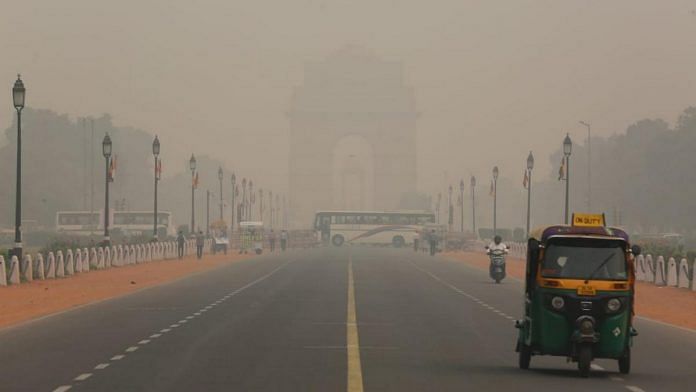New Delhi: The notorious Delhi smog that forces school shutdowns and triggers advisories to stay indoors has now become a factor in important career decisions.
People are rescheduling appointments and even launching job hunts in cleaner cities like Bengaluru and Pune when the smog season dawns.
Over the last couple of years, there has been a rise in the number of people looking to shift out of Delhi when the smog sets in, hiring agencies contacted by ThePrint said. However, they added, the applicants often change their mind when the air begins to clear up around March.
They also said that Delhi is not a preferred option for people.
In a study of 300 corporate executive movements — or job changes — among major Indian metros in the last quarter, 28 per cent shifts involved Delhi/NCR, said Kamal Karanth, co-founder of the staffing company Xpheno.
Of these 28 per cent, he added, 83 per cent were those who had switched jobs within Delhi/NCR, he added, suggesting that few people had chosen to move base to Delhi.
“Top choices for people are Bengaluru, followed by Pune and Hyderabad,” Karanth added. “Delhi is one of the last choices. Even as it depends upon the nature of the job, if there is an option to not come to Delhi, people take it,” he said.
“Among other reasons, pollution is a major reason people do not choose Delhi as an option and this trend particularly spikes during the winter months.”
Also Read: Hold government accountable for Delhi air pollution but also punish selfish behaviour
‘Gas chamber Delhi’
Delhi turns into a gas chamber every year during late October as a host of factors — the city’s year-round vehicular and industrial pollution, stubble burning by farmers in Punjab and Haryana, and Diwali firecrackers, along with the capital’s geography — come together to fuel a smog that not only reduces visibility to near zero but is also lethal to breathe in.
It has been no different this year since Diwali night, when pollution monitors in several places maxed out at an air quality index (AQI) reading of 999, the highest they can record. While Delhi’s air quality is unsafe through much of the year, it has been recorded at hazardous highs over the past two weeks.
Apart from the obvious respiratory impact and burning eyes, air quality as poor as seen in Delhi over the weekend can reportedly increase the risk of stroke, heart disease and lung cancer.
Rituparna Chakraborty, president of industry body Indian Staffing Federation said there was “a spike in the number of people wanting to change jobs from Delhi during the smog months”.
“We have noticed this change particularly in the last two years,” she added.
“There a sudden rise in anxiety during these months. People want to change the job and move away from Delhi but by the time things materialise in three-four months, many people change their mind,” she said. “Some even drop the job options that they have received, some stop pursuing further.”
Even top corporate honchos avoid the city during this season. Godrej Group chairman Adi Godrej told ThePrint he rescheduled his meetings in Delhi during these days.
“People who have their families here, people in their late 40s, those who are settled here and do not have an option to move have to stay back and manage somehow,” added Karanth.
Administrative officials at IIT-Delhi said people have become more conscious about pollution, a factor that has also started coming up during campus hiring. One faculty member, it is learnt, refused to come to Delhi and chose Mumbai instead because of rising pollution levels in the capital city.
“People have definitely become more aware of pollution in recent times and bring it up as a point of discussion during interviews,” said a professor from IIT-Delhi. “Some also express hesitation in coming to work here but we tell them that this happens every year and the situation improves.”
Also Read: Does India’s federal structure make it impossible to solve inter-state air pollution crisis?



